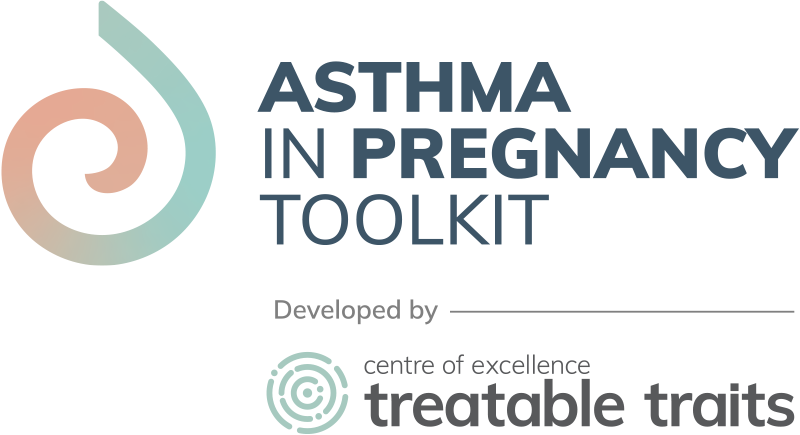Asthma symptoms during pregnancy
The symptoms of asthma that can occur during pregnancy include wheezing, dyspnoea (breathlessness), chest tightness and cough. Asthma symptoms are typically variable, and response to treatment is not altered during pregnancy. This means that the type of symptoms and their response to asthma treatment during pregnancy are similar to asthma occurring outside of pregnancy.
Dyspnoea in pregnancy
One symptom that can cause confusion is shortness of breath during pregnancy. The issues here are differentiating the effects of pregnancy from those of asthma, and the confusion around words we use to describe difficulty breathing.
During pregnancy it is normal to become more aware of breathing. This can be awareness of increased effort and/or an increased rate of breathing. These changes occur due to the hormonal changes of pregnancy and the mechanical changes of an expanding uterus. While these changes may be noticed they are not usually felt as uncomfortable or distressing. This sensation can be described as ‘shortness of breath’ or ‘breathlessness’.
When breathing becomes uncomfortable or distressing, this is referred to as dyspnoea. Asthma often causes dyspnoea while pregnancy regularly causes shortness of breath. Confusion arises because people use the same words to describe breathlessness and dyspnoea and because the common term to describe dyspnoea is also ‘short of breath’, or ‘breathless’. During pregnancy, women with asthma need to recognise whether breathing changes are due to asthma or pregnancy. Asthma is usually associated with chest tightness, cough, and/or wheezing whereas shortness of breath due to pregnancy is not. In addition, shortness of breath during pregnancy is not associated with changes in peak flow or other measures of pulmonary function.

The AAAAI (American Academy of Asthma, Allergy and Immunology) has developed a modified, validated version of the asthma control test, the P-ACT (Download here) which assesses shortness of breath due to asthma, to differentiate dyspnoea due to asthma and pregnancy (Palmsten et al. 2016).
Exacerbations / Asthma Attacks
A key feature of asthma is the development of significant airflow obstruction, usually in response to triggers such as allergens, virus infections or irritants. Every person with asthma is at risk of these events. They can vary in severity from mild to severe and life-threatening. This continues to occur during pregnancy, where as many as 1 in 2 pregnant women with asthma can experience a significant asthma exacerbation/flare-up/attack, with 1 in 10 of these exacerbations requiring oral corticosteroids. Pregnant women may also be at greater risk of hospitalisation for asthma exacerbation. (Kim et al. 2015, Murphy et al. 2006, Murphy et al. 2017).

Recognition and management of asthma attacks during pregnancy is the same as in non-pregnant women with asthma. Management is directed at relieving airway obstruction, avoiding/removing the cause if possible, and in the medium term, stabilising asthma and improving asthma control. Stabilising asthma and improving asthma control with controller therapies significantly reduces the risk of asthma exacerbation/flare-up/lung attack.
Infographic: Asthma Attacks: Recognition and Management
Asthma exacerbations in pregnant women with asthma are associated with:
- higher odds of pre-eclampsia (OR 1.30, 95% CI 1.12-1.51) and pregnancy-induced hypertension (OR 1.17, 95% CI 1.02-1.33);
- higher odds of low birthweight in the babies (OR 1.14, 95% CI 1.00-1.31)
- higher odds of preterm birth (OR 1.14, 95% CI 1.01-1.29) and
- higher odds of total congenital malformations (OR 1.21, 95% CI 1.05-1.39).
Children born to women with an asthma exacerbation during pregnancy had elevated risk of:
- asthma (OR 1.23, 95% CI 1.13-1.33)
- pneumonia (OR 1.12, 95% CI 1.03-1.22)
during the first 5 years of life (Abdullah et al. 2020)
A new systematic review and meta-analysis of studies published since the year 2000 shows that the following maternal factors are associated with increased risk of exacerbation in pregnancy: (Robijn et al. 2022)
- higher maternal age (mean difference 0.62 years, 95%CI 0.11-1.13)
- maternal obesity (RR 1.25, 95%CI 1.15-1.37)
- smoking during pregnancy (RR 1.35, 95%CI 1.04-1.75)
- black ethnicity (RR 1.62, 95%CI 1.52-1.73, using data from American studies)
- multiparity (RR 1.31, 95%CI 1.01-1.68)
- maternal depression/anxiety (RR 1.42, 95%CI 1.27-1.59)
- moderate-severe asthma (RR 3.44, 95%CI 2.03-5.83, vs mild)
- severe asthma (RR 2.70, 95%CI 1.85-3.95, vs mild-moderate)

